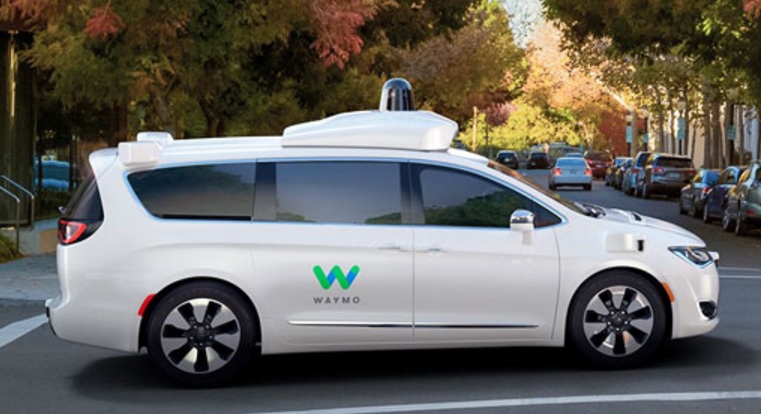Waymo and FCA want commercial AVs: Commercial fleet vehicles may be the key launch pad for autonomous, electric, and shared vehicles of the future with two companies, Waymo  and Fiat Chrysler Automobiles, making moves in this direction. Autonomous vehicle leader Waymo is pushing for California to add autonomous delivery vehicles to its allowable vehicles for testing and adoption. The Teamsters union will be fighting it over job losses for truck drivers; but Waymo has been moving in this direction for awhile, starting with a passenger delivery service in Arizona in December. FCA will be partnering with Silicon Valley self-driving car startup Aurora to develop autonomous commercial vehicles. The partners will be using the Aurora Driver platform on Fiat Chrysler commercial vehicles for autonomous driving aimed at Fiat and Ram commercial customers. FCA has been working with Waymo on autonomous Chrysler Pacifica minivans that utilize Waymo’s hardware and software. Crosstown competitors Ford and General Motors are also working on autonomous vehicles that can move either people or goods.
and Fiat Chrysler Automobiles, making moves in this direction. Autonomous vehicle leader Waymo is pushing for California to add autonomous delivery vehicles to its allowable vehicles for testing and adoption. The Teamsters union will be fighting it over job losses for truck drivers; but Waymo has been moving in this direction for awhile, starting with a passenger delivery service in Arizona in December. FCA will be partnering with Silicon Valley self-driving car startup Aurora to develop autonomous commercial vehicles. The partners will be using the Aurora Driver platform on Fiat Chrysler commercial vehicles for autonomous driving aimed at Fiat and Ram commercial customers. FCA has been working with Waymo on autonomous Chrysler Pacifica minivans that utilize Waymo’s hardware and software. Crosstown competitors Ford and General Motors are also working on autonomous vehicles that can move either people or goods.
Booming aging population: If you’re looking at social trends that will shape the future of mobility and transportation, it ain’t all about Millennials and GenZers — it’s more about Baby Boomers and the GenXers following close behind. The United Nations predicts that the world’s population of over-64-year olds will double between 2018 and the mid-2040s. As of last year, that age demographic eclipsed the number of people under the age of five for the first time in recorded history. These numbers are based on the assumption that medication and healthcare will continue to improve. Demand will continue to grow in senior-citizen communities and assisted-living facilities, for caregivers and medical professionals, and those providing rides in buses, vans, and cars. Google (and later Waymo) build this into autonomous vehicle test rides years ago. Lyft is working with GoGoGrandparent to offer monitored rides for senior citizens. Start-up company Voyage is bringing self-driving shuttles to large senior-living communities in Florida and California. Amazon Fresh and competitors like Instacart are bringing groceries to the elderly (though that usually needs to be initiated by offspring). Those providing travel services and adventure experiences to customers who don’t have to go back to work are also expected to see much growth in the next few years.
News Briefs:
Climate mayors on EV procurement: Cities devoted to fighting climate change will be making a major announcement next month, June 27, just prior to the launch of the US Conference of Mayors (USCM) Annual Meeting in Honolulu. The Climate Mayors Electric Vehicle (EV) Purchasing Collaborative will give details on its plans to “step up” its commitment to procuring public fleet electric vehicles. During the Climate Mayors Summit on June 27, this press briefing on moves being made in fleet electrification will be led by Honolulu Mayor Kirk Caldwell, Los Angeles Mayor Eric Garcetti, Boston Mayor Marty Walsh, and Knoxville Mayor Madeline Rogero.
Roaming partnership forged: Volkswagen’s Electrify America and ChargePoint have created a roaming partnership to further expand access to electric vehicle charging across the US. The interoperability agreement that will begin later this year will allow drivers to seamlessly charge their EVs on public chargers between both networks using their existing account credentials to start a session, without any additional fees. It also takes away the need to have to create new memberships, registrations, or payment configurations to charge at the other network.
FCA and Renault merger: Fiat Chrysler Automobiles NV and Renault SA may still be looking for ways to resuscitate their collapsed merger plan and secure the approval of the French carmaker’s alliance partner Nissan Motor Co Ltd , according to sources close to the companies. The deal has officially been declared over, but one tactic being discussed is Nissan urging Renault to significantly reduce its 43.4% stake in the Japanese company in return for supporting a FCA-Renault merger. FCA and Renault are blaming the French government, Renault’s largest shareholder, for demanding more time to win Nissan’s backing. FCA is under much pressure to comply with regulations, such as increasingly stringing European Union rules, to honor emissions reductions mandates. Renault’s and Nissan’s electric vehicle offerings would be part of it. It would, in FCA’s words, have “a strong position in transforming technologies, including electrification and autonomous driving.”



